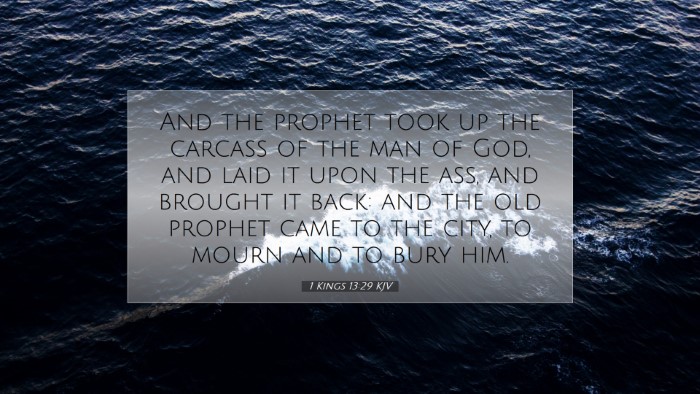Commentary on 1 Kings 13:29
The verse 1 Kings 13:29 reads: "And the prophet took up the carcass of the man of God, and laid it upon the ass, and brought it back: and the old prophet came to the city, to mourn and to bury him." This section follows the account of a man of God who delivered a prophetic message to Jeroboam, only to face tragic consequences for disobedience. It serves as a critical point for reflection on several themes central to biblical theology and practical ministry.
Historical Context
To understand the profound implications of this verse, it is essential to consider the historical backdrop of the divided kingdom in Israel. Jeroboam, who had led Israel into idolatry by instituting worship at Bethel and Dan, was confronted by the man of God. The disobedience that followed—when the man of God accepted hospitality contrary to divine instruction—culminated in his untimely death. This narrative sets the stage for understanding the gravity of obedience to God's word.
The Role of the Old Prophet
The actions of the old prophet are notable as he retrieves the body of the deceased man of God. From the perspective of Matthew Henry, the old prophet represents a figure imbued with both sorrow and the grave responsibility of preserving the sanctity of God's messenger. His retrieval of the body indicates respect and recognition of the serious nature of prophetic ministry.
-
Henry's Insight on Mourning: Henry emphasizes that the old prophet mourned not merely for the man but for the consequences of disobedience within Israel. Mourning in the biblical context often signifies an acknowledgment of sin and its results.
-
Barnes' Commentary on Burial: Albert Barnes notes that the burial of the man of God signifies the reverence that should be given to God’s servants. However, it also serves as a grim reminder of the heavy cost of straying from God’s commands.
Implications of Obedience
This verse encapsulates a pivotal lesson on the necessity of adhering strictly to divine directives. The tragedy of the man of God's life is a stark reminder for believers that both prophetic calling and personal compliance to God's word are intertwined.
-
Clarke's Perspective: Adam Clarke articulates that the man of God’s demise serves to warn all in positions of ministry and leadership regarding the dangers of complacency in faithfulness. The narrative compels leaders to consistently seek the guidance of the Holy Spirit and confirm their decisions through the Scriptures.
-
Recognition of Divine Authority: The reaction of both the man of God and the old prophet reflects a deeper theological understanding of God’s authority over life and death. Their actions embody the seriousness with which God’s people must regard His commands.
The Nature of Prophetic Ministry
Prophetic ministry in the Old Testament era was not only about delivering messages from God but also about embodying those messages through one's life. The man of God, while initially obedient, succumbed to external pressures—demonstrating the vulnerability inherent in maintaining fidelity to God’s calling.
The Relevance for Today
For contemporary pastors, students of theology, and Bible scholars, 1 Kings 13:29 serves as a poignant reminder of the cost of partial obedience. As they engage with this text, they are invited to reflect on their own lives and ministries.
-
Critical Self-Examination: This passage challenges then to engage in rigorous self-examination, asking whether they are genuinely following God's instructions without deviation.
-
Commitment to Integrity: Moreover, it underscores the need for integrity in ministry—both in leadership and in personal conduct, as the consequences of failure impact not only the individual but also the broader community of faith.
Conclusion
In conclusion, 1 Kings 13:29 is enriched with theological, ecclesiological, and practical insights for those engaged in ministry and scholarship. The narrative encourages a profound respect for the integrity of God's word and serves as a severe warning against the perils of disobedience. The continued relevance of these lessons calls believers to a deeper commitment to live according to God's will, ensuring that they uphold the truth of the Scriptures in their personal and collective lives.


